\"Dokumentarfilm\" finner opp historie om saharawisk kvinne
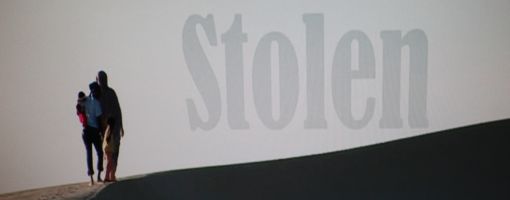
Hvis filmskaperne bak denne filmen ønsker å intervjue deg, kan det være smart om du lar være å stille opp. 'Stolen' - en film som vises på en festival i Grimstad torsdag - har diktet opp en historie om en kvinne, ved å lyve gjennom fortellerstemme og falske undertekster. En helt vanlig saharawisk kvinne framstilles som slave, til tross for at det ikke finnes dekning for det i filmen.
Publisert 19. juni 2010
"Dokumentarfilm" finner opp historie om saharawisk kvinne
Ett år før filmen 'Stolen' hadde sin premiere i Australia, sendte Fatim Salam Hamdi et brev til produsenten av filmen om at de måtte unnlate å bruke intervjumaterialet de har tatt av henne.
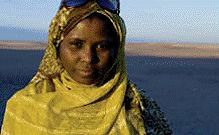 Fetim fra Vest-Sahara (t.h.) er dokumentarfilmens hovedperson, og fremstilles som en slave - til tross for at filmklippene som benyttes i filmen overhode ikke gir dekning for påstanden.
Fetim fra Vest-Sahara (t.h.) er dokumentarfilmens hovedperson, og fremstilles som en slave - til tross for at filmklippene som benyttes i filmen overhode ikke gir dekning for påstanden.
Alle scener av betydning er feiltekstet eller kryssklippet på en måte som gjør at hun framstår som en slave av sin fostermor. Fetim sier hun føler seg krenket av filmen, og ber om at den ikke vises i Norge.
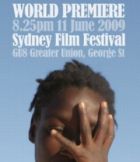 Forskjellige versjoner av filmen
Forskjellige versjoner av filmen
Denne artikkelen ble skrevet 18. juni 2010. Det har vært forskjellige versjoner av 'Stolen' etter premieren i fjor. En gjennomgang av en tidligere versjon av filmen, slik den var under premieren i Sydney, finner du her
http://www.vest-sahara.no/?cat=1&art=1522
Det var denne tidligere versjonen av filmen som ble gitt til marokkanske myndigheter, og vist på marokkansk TV et halvt år før premieren:
http://www.youtube.com/watch?v=bWRKpgkY_aY. Selve tittelen på filmen 'Stolen', henviser til at hun i barndommen ble kidnappet til et liv i slaveri. Men alle som intervjues i filmen sier at hun overhode ikke er kidnappet. Når moren og søsteren sier Fetim aldri har blitt kidnappet og at påstanden er en løgn, oversetter filmen scenen med det motsatte. Feiltekstingen av lydsporene er systematisk. Alle nøkkelscenene som bygges opp for å bevise slavetilværelsen, og samtlige intervjuer som skal forklare at hun ble stjålet fra sin biologiske mor, beviser egentlig det stikk motsatte hvis man hører på lydsporet på det lokale språket, hassaniya.
Den australske Vest-Sahara-komiteen utarbeidet i fjor en rapport om den australsk-lagde filmen. Filmen utviser hårreisende oversettelsesfeil. Filmen hevder å ha brukt en sertifisert oversetter. Men ingen av hans innspill ble noen gang tatt til etterretning, og han har gått hardt ut mot produsentene. Også Al Jazeera-oversettere og australsk TV har gått i strupen på de hårreisende feilene. Oversetteren som filmmakerne hevder har sertifisert oversettelsen har også gått i strupen på filmmakerne, og sier han aldri har gått god for tekstingen.
Støttekomiteen for Vest-Sahara har gjort sin egen gjennomgang av dokumentasjonen, og funnet det samme - i tillegg har vi funnet masse mer løgner, knyttet til presentasjonen av hun som i filmen påstås å være slaveeier.
Hvilken filmfestival kommer til å bli den første til å sette seg inn i lydsporet til denne filmen sammen med en tolk?
Her er noen av feilene (appendiksene det henvises til nedenfor er å finne i den nevnte australske rapporten). I tillegg til de feilaktige scenene nedenfor, har en håndfull saharawier mot som opptrer senere i filmen, sagt de har fått betalt for å la seg intervjue om at det finnes slaveri i leirene.
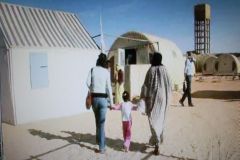 06.10: misrepresentation
06.10: misrepresentation
Violeta and Fetim meet with the UN about the family visit. Much is made of the fact that Fetim is not on the list. This is irrelevant as Fetim's mother is registered in El Ayoun. The family visit goes ahead as planned.
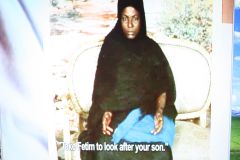 08:03 - mistranslated subtitles
08:03 - mistranslated subtitles
Film translation:
Deido: Fetim's mother told me 'Take Fetim to look after your son'. It was Gods will. Thanks to God.
Correct translation:
Deido: Fetim's mother told me 'Let Fetim go with you so she can play with your son'. This is the story. This is the truth.
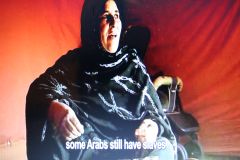 08:48 08:59 - mistranslation
08:48 08:59 - mistranslation
She talks about the past, not the present. The talk is about how the two families met in the past.
Film translation:
Saharan people are not all the same. Some of them buy black people and own them, others free them but keep them as their family. We don't talk about this anymore.
Correct translation:
There were traditions among the Saharawi people. The Saharawis are not the same [meaning, there are differences between them]. The majority freed the people [that they had as slaves]. But others kept them [at the time].
09:00: mistranslation
This is a key sentence showing Deido's apparent nature as slave owner - which is wrong. The original Stolen film contained also reference to Deido having liberated 3 of Fetim's brothers.
Film translation:
Violeta: Fetim is liberated?
Deido: Yes, I liberated her.
Correct translation:
Violeta: Fetim is liberated?
Deido: Yes, she is free. She and her three brothers are free.
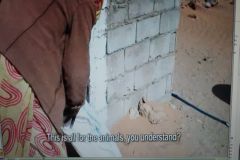 09.26: mistranslation and misrepresentation
09.26: mistranslation and misrepresentation
The film in general shows Fetim doing domestic work for Deido (her adopted-mother) as evidence of slavery.
This is a key scene, and the first of the only 2 scenes in the entire film in which one get's impression that Fetim is working on order from Deido. The goats in fact belong to Fetim - not to Deido. In fact, from the conversation in the film it appears that it was Deido who was going to feed the goats! The evidence that the goats actually belong to Fetim - and not Deido - is that Deido on the soundtrack asks how many goats Fetim really is going to feed. This part of the soundtrack - regarding the number of goats - is now hard possible to hear, under the voiceover, but was possible in former version of the film screened in 2009.
Film translation:
Deido: Take this, it's for my goats! This is all for the animals, you understand?
Fetim: Did you give me the same food yesterday?
Deido: Yes.
Deido: Thats all. That's the dry food to take.
Correct translation:
Deido: Ive got the food for the goats. Its better if you put it in a dry dish.
Fetim: Should I take her [the child] to the woman? (Deido was baby-sitting Fetims
baby daughter).
Deido: You mean to the foreigner? Will she baby-sit her?
Fetim: Yes.
Deido: Are they only two?
Fetim: Three [goats].
Deido: That is fine, but put it in a dry dish.
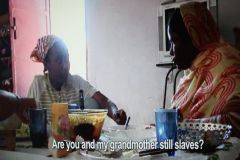 12.55: Mistranslation and deceptive editing
12.55: Mistranslation and deceptive editing
Violeta, Leil and Fetim are eating and having a conversation. Note that the texting is completely different from texting of the version in 2009, but still very far from the correct. Notice also the very many cuts. There is also an interesting comment from Leil, in Spanish, which is not subtitled. She states "Yes, I also say that". Why would she say that unless she had not already translated something that she expresses her agreement to?
Film translation:
Leil: Is it true my white grandmother beat you as a child?
Fetim: I swear to God...Violeta already knows. It happened when I was little. You'll be in trouble by saying we were beaten.
Leil: Then what should I tell her?
Fetim: It's always been that slaves are beaten from a young age.
Correct translation:
Leil: She said someone told her that you were beaten when you were young
Fetim: What is this? All the children when young get beaten.
(Cut)
Leil: What do I tell her?
Fetim: Tell her that they get beaten.
(Cut)
Fetim: Now you put yourself in a dilemma. Then, say slaves when young always get
beaten.
Leil: [in Spanish translating Fetim for Violeta] Yes, I also say that.
13:30 - Mistranslation (from Spanish)
Film translation:
Fetim: In America, aren't there any slave families? No?...But before?
Correct translation:
Fetim: In America, aren't there any families? No?...But before?
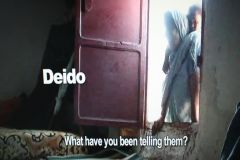 13.56: mistranslation and manipulation
13.56: mistranslation and manipulation
The film depicts the following scene as an attempt by Deido to cover up the issue of slavery. Deido is actually talking about spending money on celebrations for the reunion. She wants to spend her own money but Leil is saying she doesnt need to because Violeta has offered to pay. However, the film-makers offer is causing tension within the family.
Film translation:
Leil: I didn't tell Violeta anything. I just say what I've been told. What do you want me to tell her?
Deido: What did she ask you?
Leil: She said...
Deido: You should tell her Fetim is the most important....
Leil: That's what I told them!
Deido: ...and everyone is happy here
Correct translation:
Deido: Tell her I am happy. Its a big day. Im spending money wisely.
Leil: I didn't tell her anything special, we were just talking, What do I tell her?
Leil: But youll spend all your money. What do I tell her?
Deido: What did she say? When you spend your money
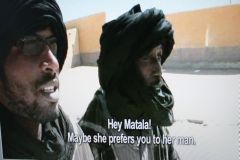 16.10 mistranslated subtitles
16.10 mistranslated subtitles
Matala and his friend are chatting in the back of the truck as they drive around to buy a camel
Film translation:
Matalas friend: She is looking at you. Hey Matala! Maybe she prefers you to her man.
Matala: I dont think so.
Matalas friend: Shame on you you cant get this girl.
Matala: Shes just filming.
Matalas friend: Yeh sure.
Correct translation:
Matalas friend: This man [Dan] really loves filming. He is concentrating on you.
Matala: He is listening to what youre saying.
Matalas friend: Come on, as if he can understand me.
Matala: But hes recording. And he will translate what youre saying.
Matalas friend: Let him translate it. Whats the problem of me saying that hes watching you.
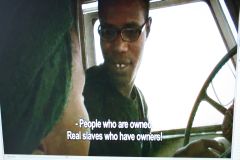 18.10: Misrepresentation and manipulative methods
18.10: Misrepresentation and manipulative methods
Hamadoune and Leil wait in the car while Matala goes off to find a camel. Hamadoune who appears not to speak fluent Spanish because Leil is translating for him, suddenly says in fluent Spanish the words that are used to publicise the film, slavery man to man is the saddest thing in the world. Hamadoune and Leil giggle as they continue to talk about a very serious subject which seems an unlikely topic to be discussing while buying a camel for a big celebration.
21:40 - Inappropriate
Anyone with sensitivity to the culture of the Sahrawis would certainly not publish this clip of Fetim preparing herself for the party, without very clear prior permission. This has not been given.
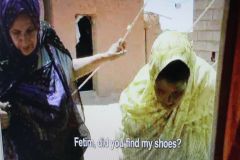 23.59: Mistranslation and misrepresentation
23.59: Mistranslation and misrepresentation
Embarka is about to arrive. The subtitles suggest that rather than allow her to welcome her mother, Deido orders Fetim to find her shoes. The scene is a crucial element in presenting Fetim as a slave. Before the false subtitles are presented, the narrator says with a shocked voice: I couldnt believe it with Fetim jumped up to look for Deido's shoes. Her mother and sister had only been there for 10 minutes. But Deido is never talking about any shoes.
Before Deido comes walking over to Fetim, everyone keeps talking about "sukkar": sugar (for the tea, very obviously). In the next scene, Fetim, sits in the same position with the same child in the lap, indicating that it's right after the previous "sugar" scene. When Deido approaches her, it's totally impossible to hear Deido's voice and Fetim is also not heard or seen talking at all. She can't possibly be saying anything (audible) about the whereabouts of the shoes.
At 24:12, another person comes out of the tent with a handful of fresh mint leaves.
Deido, apparently directed towards the other woman, bearing mint leaves: Have you given mint to of the women [who are making tea]. Do we have two tea-trays or three?
The mint woman: [inaudible]
24:15: Fetim does not seem to pay attention or take part in the conversation in any way, -smiles, is handed her own shoes by someone- puts on her own shoes and walks away.
24:22: Deido stays in the opening of the tent, rummaging around a bit, seems to put on her own shoes.
Film translation:
Deido: Where are my shoes?
Fetim: They are over there.
Correct translation:
Deido: Have we got mint [for tea]? Have you given mint to of the women [who are making tea]. Do we have two tea-trays or three?
Fetim: Its over there.
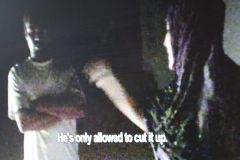 24.29: Misrepresentation
24.29: Misrepresentation
We are told by the narration that Matala is not allowed to kill the camel as that is an honour reserved for an Arab. This is not factually correct. The entire scene is misrepresented.
What happened - and what Deido is trying to explain in this sequence - is that Matala told Deido that he has never killed anything before. This is not unusual because in Sahrawi society, it is the older experienced men who slaughter animals. Deido wanted to make sure that either someone with experience kills the camel or if Matala insisted, someone older should go with the young men to show them how to do it. During the scene, one of Matalas friends tells Deido that Violeta says she owns the camel and that she insists that Matala kills it.
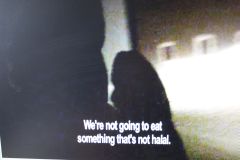 The part of the Halal is never stated.
The part of the Halal is never stated.
The translation of what Matala and his friends were saying is incorrect.
Film translation:
Young man 1: Lets go leave them here.
Young man 2: Are you coming with us.
Correct translation:
Young man 1: Are you going to carry the foreigners on your backs?
Young man 2: The foreigners dont need you. Come get away from these foreigners.
25.13: Manipulative film-making
A distressing and gruesome slaughter of the camel is filmed. Its neck is slit and blood drains onto the sand. The scene contributes to the depiction of Saharawi people as brutal and savage with the implication being that they were easily capable of slavery. It is an emotional technique designed to whip up anti-Arab sentiments as journalist Bob Ellis discussed in his article Robbed of the Truth (http://www.abc.net.au/unleashed/stories/s2598993.htm)
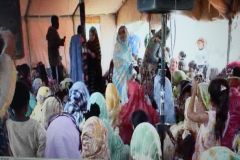 26.24: Misrepresentation
26.24: Misrepresentation
The film-makers say that Deido invited only her family and friends, not including her male cousin, Matala. This is misleading. As is customary, everyone was invited. However, that particular celebration was only for women.
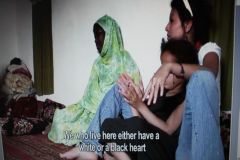 27.18: Manipulative film-making methods
27.18: Manipulative film-making methods
Fetims friend Jueda talks about everyone in the camps having a black or a white heart and that Fetim has a white heart. The conversation was setup by the film-makers. Fetim was asked by Violeta to visit her friend saying Juedas daughter had been in a car accident. When she got there, Jueda and her daughter were perfectly fine. Fetim says that as soon as she realised it was a set-up, she got up and left. After Fetim has left Jueda says, She does what Deido tells her.
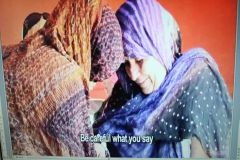 33.02: Mistranslation and misrepresentation
33.02: Mistranslation and misrepresentation
Deido and a woman chatting. The narration informs us that the woman is the wife of a Polisario official. No name is given of the wife or the husband. The womans face is not shown on camera. Deido's speech is not correctly translated.
Film translation:
Woman: Why are they always filming?
Deido: It doesnt matter.
Woman: Be careful what you say.
Deido: They know everything but they cant do anything.
Correct translation:
It is customary in the camps that if a family receives visitors from the occupied territory, people bring money and gifts to give to the family and the guests. The woman appears to be trying to give some money to Deido.
Deido: Take it back. I dont want it. Give it to her [Embarka]. I will not take a penny. I swear. I wont take it. The other woman is inaudible.
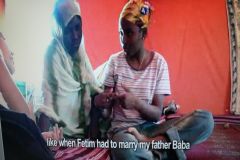 33:39 - misrepresentation
33:39 - misrepresentation
The context in this conversation is in past tense. The questions from Violeta is how the slavery situation WAS in the past, generations ago.
At 34:10 Leil states "like when Fetim had to marry my father Baba, he first asked if Fetim is liberated". This does NOT refer to any episode that had taken place between Fetim and Baba, but is stated in parallell to what the situation had been now had it happened in the past.
40.11 - implausible story
The film-makers say that Matala has told them to be careful of the tapes as the Polisario want to take them. So they decide to hide them in the desert surrounding the 27 February Camp. Cate Lewis from the Australian Western Sahara Association has been to this camp several times. As the ground is rock hard in that area she asked the film-makers how they did this. They could not explain how they dug a hole in the hard ground or agree with each others account of the event (Appendix I). It is also questionable that tapes could have survived the searing heat of the desert for several weeks. In the film they state the temperature in one day reached 45 degrees Celsius.
Producer Tom Zubrycki has later admitted the tapes were not buried in the sand as stated in the film:
http://www.screenhub.com.au/news/shownewsarticleG.asp?newsID=31764
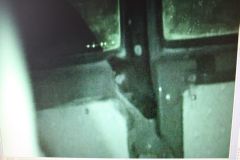 40.22 - fictitious scene
40.22 - fictitious scene
The film-makers claim that when they returned to Fetims house the Head of Security and the Head of Protocol were there. They claim they were afraid so left. They think the Polisario might confiscate their tapes, so decide to bury the tapes in the desert. Then, as they are making their way through the desert at night, they claim they are suddenly surrounded by police and arrested. They then claim they are detained for several hours and that the Polisario threatened to confiscate their tapes.
What actually happened was that the film-makers left Fetims house at approximately 9pm.
They phoned their producer Tom Zubrycki in Australia, who in turn contacted Kamal Fadel, the Polisario representative in Australia. In response to Zubryckis concern for their safety, Fadel immediately contacted the camps.
Officials in the camps then spent eight hours looking for them. They were eventually found by the Head of Protocol, Brahim Mokhtar, inside the quarters of a Cuban medical team where they had spent the night. It was 5pm in the afternoon and still light. There was one other person with Brahim.
Because of the concern their disappearance had raised, Brahhim Mokhtar asked an independent witness to attend the debriefing. Two members of the UN mission, MINURSO agreed to be present at the meeting. The film-makers were asked to remain in his office until the UN officers arrived. A discussion took place and the film-makers asked to be taken from the camps to Tindouf by the MINURSO members.
This sequence of events is corroborated by emails from Tom Zubrycki and film-makers press release (Appendix B) in which they state, After negotiations with the Polisario, we were allowed to leave with the UN officers. At all times the Polisario looked after us and afforded us every courtesy.
41.56: misrepresentation
The film-makers claim that they are stuck in Tindouf and cant leave because the Polisario want their tapes, but they give no evidence. Tindouf is in Algeria and not part of the camps. There are only three flights a week and the filmmakers were simply waiting in a hotel for their flight, which they caught.
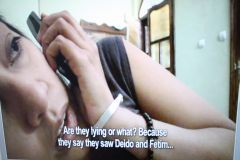 42.58: misrepresentation and manipulative techniques
42.58: misrepresentation and manipulative techniques
Violeta is talking on the phone to Leil. Leil is obviously very distressed. The film implies that this is because Violeta has exposed slavery and Leil and her family are now in trouble. But rather she is upset because everyone has been worried and searching the camps for the film-makers. The subtitles suggest its the films the police are looking for, not the film-makers. Leil says in trying to do good, you did bad.
Leil is a young and impressionable girl. This conversation demonstrates the stress she has experienced by being involved in the making of the film. Using a child in this way in most films would be considered inappropriate and a form of exploitation.
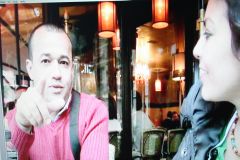 45.48 Moroccan involvement
45.48 Moroccan involvement
In Paris, Dans voiceover tells us that they have been receiving calls from a Moroccan. Eventually they decide to meet him in case he can help them get to Mauritania to recover their tapes.
48.30 manipulation, payment for statements
The filmmakers meet up with several young men in Mauritania, who come allegedly to record their statements again in case the tapes are not recovered. The filmmakers film statements about slavery in the camps. Note that some of this footage is the same as that which they claim was Stolen in Morocco and ended up on YouTube.
These men have now retracted their statements, saying they were directed by the film-makers to say they were slaves. Their statements (filmed by independent film-maker Carlos Gonzalez can be viewed at http://media.smh.com.au/sahara-slavery-fiercely-denied-582354.html in which they say they were given money by the film-makers and by Moroccan officials.
The film-makers have acknowledged they paid for them to travel to and from Mauritania.
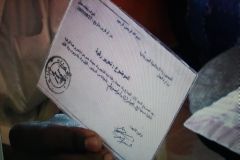 48.49 misrepresentation
48.49 misrepresentation
See on the top right of this document. There it says "Islamic Repucblic of Mauritania". The filmmakers present a liberation from slavery card to prove the existence of slavery in the Saharawi camps. However, no mention is made of the fact that the card has been issued by another country, Mauritania, and has nothing do to with the camps.
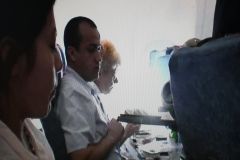 55.54 Moroccan involvement
55.54 Moroccan involvement
The Moroccan suddenly appears in Mauritania. He offers to send their tapes out of Mauritania in a diplomatic bag. Ayala and Fallshaw agree to fly with him to New York to do a press conference. The film-makers have acknowledged that their airfares to New York were paid by the Moroccan.
59.33 Moroccan involvement and misrespresentation
The film-makers arrive in New York and meet up with the Moroccan to hold the press conference however they say the press conference doesnt take place. They then travel to Casablanca where they are given their tapes by the Moroccan. We are not told that a press conference does take place 3 months later.
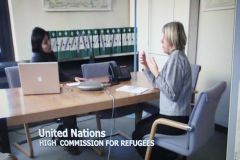 59.44 manipulated Interview
59.44 manipulated Interview
The film-makers interview Deputy Director of the Africa and Middle East division of UNHCR, Ursula Aboubacar about UNHCRs position on slavery in the camps. The film-makers interrupt on several occasions making assertions about slavery in the camps and the interview is heavily edited. The transcript is attached (Appendix F).
Aboubacar stated in an email to the film-makers which has subsequently been released to the media that her interview was cut, manipulated and did not accurately represent the views of UNHCR. She also stated that the film-makers became aggressive when she refused to confirm the existence of slavery in the camps and that she did not sign a release form and was not shown the final film for approval despite her written requests. The High Commissioner for Refugees has also expressed similar concerns in writing (Appendix D).
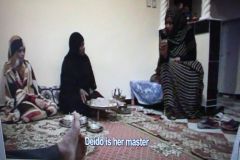 1.03.01 mistranslated subtitles
1.03.01 mistranslated subtitles
Embarka and Fatma are back in the occupied territory. Violeta is talking to them. This is the third time in the movie it is denied that Fetim has been kidnapped by Deido when Fetim was a child.
Film translation:
Violeta: Why did Fetim go with Deido [Fetims adopted mother]?
Fatma: Deido always wanted Fetim. And from there to the camps. There was nothing unusual about Deido taking Fetim. Deido is her master. And obviously controls her.
Correct translation:
Fatma to Violeta: Deido was visiting and Fetim left with her. When the March took place [the 1975 Green March invasion], they were in Hagounia. They went from there to the Front [camps]. And we stayed here because of the March.
Fatma then speaks to her family members: Bottom line, she is tracking the story of Fetim. Frankly, she thinks Deido owns her.
Embarka: Not true.
Fatma: Fetim told me that someone told her [Violeta] that Deido kidnapped Fetim. But she did not kidnap her.
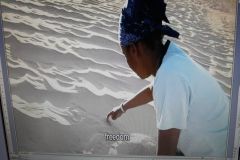 1.09.48 misrepresentation
1.09.48 misrepresentation
Leil writes in the sand We Want Peace and Freedom. This refers to the struggle for Independence but in the context of the film is clearly given the impression it refers to liberation from slavery. And which two words in the sand were not subtitled? Sahara Libre.
The film ends with a selective quote taken out of context from the Human Rights Watch report. The report does not state what is mentioned. Read the HRW yourself: http://www.hrw.org/en/reports/2008/12/19/human-rights-western-sahara-and-tindoufrefugee-camps-0
Ett år før filmen 'Stolen' hadde sin premiere i Australia, sendte Fatim Salam Hamdi et brev til produsenten av filmen om at de måtte unnlate å bruke intervjumaterialet de har tatt av henne.
 Fetim fra Vest-Sahara (t.h.) er dokumentarfilmens hovedperson, og fremstilles som en slave - til tross for at filmklippene som benyttes i filmen overhode ikke gir dekning for påstanden.
Fetim fra Vest-Sahara (t.h.) er dokumentarfilmens hovedperson, og fremstilles som en slave - til tross for at filmklippene som benyttes i filmen overhode ikke gir dekning for påstanden.Alle scener av betydning er feiltekstet eller kryssklippet på en måte som gjør at hun framstår som en slave av sin fostermor. Fetim sier hun føler seg krenket av filmen, og ber om at den ikke vises i Norge.
 Forskjellige versjoner av filmen
Forskjellige versjoner av filmenDenne artikkelen ble skrevet 18. juni 2010. Det har vært forskjellige versjoner av 'Stolen' etter premieren i fjor. En gjennomgang av en tidligere versjon av filmen, slik den var under premieren i Sydney, finner du her
http://www.vest-sahara.no/?cat=1&art=1522
Det var denne tidligere versjonen av filmen som ble gitt til marokkanske myndigheter, og vist på marokkansk TV et halvt år før premieren:
http://www.youtube.com/watch?v=bWRKpgkY_aY. Selve tittelen på filmen 'Stolen', henviser til at hun i barndommen ble kidnappet til et liv i slaveri. Men alle som intervjues i filmen sier at hun overhode ikke er kidnappet. Når moren og søsteren sier Fetim aldri har blitt kidnappet og at påstanden er en løgn, oversetter filmen scenen med det motsatte. Feiltekstingen av lydsporene er systematisk. Alle nøkkelscenene som bygges opp for å bevise slavetilværelsen, og samtlige intervjuer som skal forklare at hun ble stjålet fra sin biologiske mor, beviser egentlig det stikk motsatte hvis man hører på lydsporet på det lokale språket, hassaniya.
Den australske Vest-Sahara-komiteen utarbeidet i fjor en rapport om den australsk-lagde filmen. Filmen utviser hårreisende oversettelsesfeil. Filmen hevder å ha brukt en sertifisert oversetter. Men ingen av hans innspill ble noen gang tatt til etterretning, og han har gått hardt ut mot produsentene. Også Al Jazeera-oversettere og australsk TV har gått i strupen på de hårreisende feilene. Oversetteren som filmmakerne hevder har sertifisert oversettelsen har også gått i strupen på filmmakerne, og sier han aldri har gått god for tekstingen.
Støttekomiteen for Vest-Sahara har gjort sin egen gjennomgang av dokumentasjonen, og funnet det samme - i tillegg har vi funnet masse mer løgner, knyttet til presentasjonen av hun som i filmen påstås å være slaveeier.
Hvilken filmfestival kommer til å bli den første til å sette seg inn i lydsporet til denne filmen sammen med en tolk?
Her er noen av feilene (appendiksene det henvises til nedenfor er å finne i den nevnte australske rapporten). I tillegg til de feilaktige scenene nedenfor, har en håndfull saharawier mot som opptrer senere i filmen, sagt de har fått betalt for å la seg intervjue om at det finnes slaveri i leirene.
 06.10: misrepresentation
06.10: misrepresentationVioleta and Fetim meet with the UN about the family visit. Much is made of the fact that Fetim is not on the list. This is irrelevant as Fetim's mother is registered in El Ayoun. The family visit goes ahead as planned.
 08:03 - mistranslated subtitles
08:03 - mistranslated subtitlesFilm translation:
Deido: Fetim's mother told me 'Take Fetim to look after your son'. It was Gods will. Thanks to God.
Correct translation:
Deido: Fetim's mother told me 'Let Fetim go with you so she can play with your son'. This is the story. This is the truth.
 08:48 08:59 - mistranslation
08:48 08:59 - mistranslationShe talks about the past, not the present. The talk is about how the two families met in the past.
Film translation:
Saharan people are not all the same. Some of them buy black people and own them, others free them but keep them as their family. We don't talk about this anymore.
Correct translation:
There were traditions among the Saharawi people. The Saharawis are not the same [meaning, there are differences between them]. The majority freed the people [that they had as slaves]. But others kept them [at the time].
09:00: mistranslation
This is a key sentence showing Deido's apparent nature as slave owner - which is wrong. The original Stolen film contained also reference to Deido having liberated 3 of Fetim's brothers.
Film translation:
Violeta: Fetim is liberated?
Deido: Yes, I liberated her.
Correct translation:
Violeta: Fetim is liberated?
Deido: Yes, she is free. She and her three brothers are free.
 09.26: mistranslation and misrepresentation
09.26: mistranslation and misrepresentationThe film in general shows Fetim doing domestic work for Deido (her adopted-mother) as evidence of slavery.
This is a key scene, and the first of the only 2 scenes in the entire film in which one get's impression that Fetim is working on order from Deido. The goats in fact belong to Fetim - not to Deido. In fact, from the conversation in the film it appears that it was Deido who was going to feed the goats! The evidence that the goats actually belong to Fetim - and not Deido - is that Deido on the soundtrack asks how many goats Fetim really is going to feed. This part of the soundtrack - regarding the number of goats - is now hard possible to hear, under the voiceover, but was possible in former version of the film screened in 2009.
Film translation:
Deido: Take this, it's for my goats! This is all for the animals, you understand?
Fetim: Did you give me the same food yesterday?
Deido: Yes.
Deido: Thats all. That's the dry food to take.
Correct translation:
Deido: Ive got the food for the goats. Its better if you put it in a dry dish.
Fetim: Should I take her [the child] to the woman? (Deido was baby-sitting Fetims
baby daughter).
Deido: You mean to the foreigner? Will she baby-sit her?
Fetim: Yes.
Deido: Are they only two?
Fetim: Three [goats].
Deido: That is fine, but put it in a dry dish.
 12.55: Mistranslation and deceptive editing
12.55: Mistranslation and deceptive editingVioleta, Leil and Fetim are eating and having a conversation. Note that the texting is completely different from texting of the version in 2009, but still very far from the correct. Notice also the very many cuts. There is also an interesting comment from Leil, in Spanish, which is not subtitled. She states "Yes, I also say that". Why would she say that unless she had not already translated something that she expresses her agreement to?
Film translation:
Leil: Is it true my white grandmother beat you as a child?
Fetim: I swear to God...Violeta already knows. It happened when I was little. You'll be in trouble by saying we were beaten.
Leil: Then what should I tell her?
Fetim: It's always been that slaves are beaten from a young age.
Correct translation:
Leil: She said someone told her that you were beaten when you were young
Fetim: What is this? All the children when young get beaten.
(Cut)
Leil: What do I tell her?
Fetim: Tell her that they get beaten.
(Cut)
Fetim: Now you put yourself in a dilemma. Then, say slaves when young always get
beaten.
Leil: [in Spanish translating Fetim for Violeta] Yes, I also say that.
13:30 - Mistranslation (from Spanish)
Film translation:
Fetim: In America, aren't there any slave families? No?...But before?
Correct translation:
Fetim: In America, aren't there any families? No?...But before?
 13.56: mistranslation and manipulation
13.56: mistranslation and manipulationThe film depicts the following scene as an attempt by Deido to cover up the issue of slavery. Deido is actually talking about spending money on celebrations for the reunion. She wants to spend her own money but Leil is saying she doesnt need to because Violeta has offered to pay. However, the film-makers offer is causing tension within the family.
Film translation:
Leil: I didn't tell Violeta anything. I just say what I've been told. What do you want me to tell her?
Deido: What did she ask you?
Leil: She said...
Deido: You should tell her Fetim is the most important....
Leil: That's what I told them!
Deido: ...and everyone is happy here
Correct translation:
Deido: Tell her I am happy. Its a big day. Im spending money wisely.
Leil: I didn't tell her anything special, we were just talking, What do I tell her?
Leil: But youll spend all your money. What do I tell her?
Deido: What did she say? When you spend your money
 16.10 mistranslated subtitles
16.10 mistranslated subtitlesMatala and his friend are chatting in the back of the truck as they drive around to buy a camel
Film translation:
Matalas friend: She is looking at you. Hey Matala! Maybe she prefers you to her man.
Matala: I dont think so.
Matalas friend: Shame on you you cant get this girl.
Matala: Shes just filming.
Matalas friend: Yeh sure.
Correct translation:
Matalas friend: This man [Dan] really loves filming. He is concentrating on you.
Matala: He is listening to what youre saying.
Matalas friend: Come on, as if he can understand me.
Matala: But hes recording. And he will translate what youre saying.
Matalas friend: Let him translate it. Whats the problem of me saying that hes watching you.
 18.10: Misrepresentation and manipulative methods
18.10: Misrepresentation and manipulative methodsHamadoune and Leil wait in the car while Matala goes off to find a camel. Hamadoune who appears not to speak fluent Spanish because Leil is translating for him, suddenly says in fluent Spanish the words that are used to publicise the film, slavery man to man is the saddest thing in the world. Hamadoune and Leil giggle as they continue to talk about a very serious subject which seems an unlikely topic to be discussing while buying a camel for a big celebration.
21:40 - Inappropriate
Anyone with sensitivity to the culture of the Sahrawis would certainly not publish this clip of Fetim preparing herself for the party, without very clear prior permission. This has not been given.
 23.59: Mistranslation and misrepresentation
23.59: Mistranslation and misrepresentationEmbarka is about to arrive. The subtitles suggest that rather than allow her to welcome her mother, Deido orders Fetim to find her shoes. The scene is a crucial element in presenting Fetim as a slave. Before the false subtitles are presented, the narrator says with a shocked voice: I couldnt believe it with Fetim jumped up to look for Deido's shoes. Her mother and sister had only been there for 10 minutes. But Deido is never talking about any shoes.
Before Deido comes walking over to Fetim, everyone keeps talking about "sukkar": sugar (for the tea, very obviously). In the next scene, Fetim, sits in the same position with the same child in the lap, indicating that it's right after the previous "sugar" scene. When Deido approaches her, it's totally impossible to hear Deido's voice and Fetim is also not heard or seen talking at all. She can't possibly be saying anything (audible) about the whereabouts of the shoes.
At 24:12, another person comes out of the tent with a handful of fresh mint leaves.
Deido, apparently directed towards the other woman, bearing mint leaves: Have you given mint to of the women [who are making tea]. Do we have two tea-trays or three?
The mint woman: [inaudible]
24:15: Fetim does not seem to pay attention or take part in the conversation in any way, -smiles, is handed her own shoes by someone- puts on her own shoes and walks away.
24:22: Deido stays in the opening of the tent, rummaging around a bit, seems to put on her own shoes.
Film translation:
Deido: Where are my shoes?
Fetim: They are over there.
Correct translation:
Deido: Have we got mint [for tea]? Have you given mint to of the women [who are making tea]. Do we have two tea-trays or three?
Fetim: Its over there.
 24.29: Misrepresentation
24.29: MisrepresentationWe are told by the narration that Matala is not allowed to kill the camel as that is an honour reserved for an Arab. This is not factually correct. The entire scene is misrepresented.
What happened - and what Deido is trying to explain in this sequence - is that Matala told Deido that he has never killed anything before. This is not unusual because in Sahrawi society, it is the older experienced men who slaughter animals. Deido wanted to make sure that either someone with experience kills the camel or if Matala insisted, someone older should go with the young men to show them how to do it. During the scene, one of Matalas friends tells Deido that Violeta says she owns the camel and that she insists that Matala kills it.
 The part of the Halal is never stated.
The part of the Halal is never stated. The translation of what Matala and his friends were saying is incorrect.
Film translation:
Young man 1: Lets go leave them here.
Young man 2: Are you coming with us.
Correct translation:
Young man 1: Are you going to carry the foreigners on your backs?
Young man 2: The foreigners dont need you. Come get away from these foreigners.
25.13: Manipulative film-making
A distressing and gruesome slaughter of the camel is filmed. Its neck is slit and blood drains onto the sand. The scene contributes to the depiction of Saharawi people as brutal and savage with the implication being that they were easily capable of slavery. It is an emotional technique designed to whip up anti-Arab sentiments as journalist Bob Ellis discussed in his article Robbed of the Truth (http://www.abc.net.au/unleashed/stories/s2598993.htm)
 26.24: Misrepresentation
26.24: MisrepresentationThe film-makers say that Deido invited only her family and friends, not including her male cousin, Matala. This is misleading. As is customary, everyone was invited. However, that particular celebration was only for women.
 27.18: Manipulative film-making methods
27.18: Manipulative film-making methodsFetims friend Jueda talks about everyone in the camps having a black or a white heart and that Fetim has a white heart. The conversation was setup by the film-makers. Fetim was asked by Violeta to visit her friend saying Juedas daughter had been in a car accident. When she got there, Jueda and her daughter were perfectly fine. Fetim says that as soon as she realised it was a set-up, she got up and left. After Fetim has left Jueda says, She does what Deido tells her.
 33.02: Mistranslation and misrepresentation
33.02: Mistranslation and misrepresentationDeido and a woman chatting. The narration informs us that the woman is the wife of a Polisario official. No name is given of the wife or the husband. The womans face is not shown on camera. Deido's speech is not correctly translated.
Film translation:
Woman: Why are they always filming?
Deido: It doesnt matter.
Woman: Be careful what you say.
Deido: They know everything but they cant do anything.
Correct translation:
It is customary in the camps that if a family receives visitors from the occupied territory, people bring money and gifts to give to the family and the guests. The woman appears to be trying to give some money to Deido.
Deido: Take it back. I dont want it. Give it to her [Embarka]. I will not take a penny. I swear. I wont take it. The other woman is inaudible.
 33:39 - misrepresentation
33:39 - misrepresentationThe context in this conversation is in past tense. The questions from Violeta is how the slavery situation WAS in the past, generations ago.
At 34:10 Leil states "like when Fetim had to marry my father Baba, he first asked if Fetim is liberated". This does NOT refer to any episode that had taken place between Fetim and Baba, but is stated in parallell to what the situation had been now had it happened in the past.
40.11 - implausible story
The film-makers say that Matala has told them to be careful of the tapes as the Polisario want to take them. So they decide to hide them in the desert surrounding the 27 February Camp. Cate Lewis from the Australian Western Sahara Association has been to this camp several times. As the ground is rock hard in that area she asked the film-makers how they did this. They could not explain how they dug a hole in the hard ground or agree with each others account of the event (Appendix I). It is also questionable that tapes could have survived the searing heat of the desert for several weeks. In the film they state the temperature in one day reached 45 degrees Celsius.
Producer Tom Zubrycki has later admitted the tapes were not buried in the sand as stated in the film:
http://www.screenhub.com.au/news/shownewsarticleG.asp?newsID=31764
 40.22 - fictitious scene
40.22 - fictitious sceneThe film-makers claim that when they returned to Fetims house the Head of Security and the Head of Protocol were there. They claim they were afraid so left. They think the Polisario might confiscate their tapes, so decide to bury the tapes in the desert. Then, as they are making their way through the desert at night, they claim they are suddenly surrounded by police and arrested. They then claim they are detained for several hours and that the Polisario threatened to confiscate their tapes.
What actually happened was that the film-makers left Fetims house at approximately 9pm.
They phoned their producer Tom Zubrycki in Australia, who in turn contacted Kamal Fadel, the Polisario representative in Australia. In response to Zubryckis concern for their safety, Fadel immediately contacted the camps.
Officials in the camps then spent eight hours looking for them. They were eventually found by the Head of Protocol, Brahim Mokhtar, inside the quarters of a Cuban medical team where they had spent the night. It was 5pm in the afternoon and still light. There was one other person with Brahim.
Because of the concern their disappearance had raised, Brahhim Mokhtar asked an independent witness to attend the debriefing. Two members of the UN mission, MINURSO agreed to be present at the meeting. The film-makers were asked to remain in his office until the UN officers arrived. A discussion took place and the film-makers asked to be taken from the camps to Tindouf by the MINURSO members.
This sequence of events is corroborated by emails from Tom Zubrycki and film-makers press release (Appendix B) in which they state, After negotiations with the Polisario, we were allowed to leave with the UN officers. At all times the Polisario looked after us and afforded us every courtesy.
41.56: misrepresentation
The film-makers claim that they are stuck in Tindouf and cant leave because the Polisario want their tapes, but they give no evidence. Tindouf is in Algeria and not part of the camps. There are only three flights a week and the filmmakers were simply waiting in a hotel for their flight, which they caught.
 42.58: misrepresentation and manipulative techniques
42.58: misrepresentation and manipulative techniquesVioleta is talking on the phone to Leil. Leil is obviously very distressed. The film implies that this is because Violeta has exposed slavery and Leil and her family are now in trouble. But rather she is upset because everyone has been worried and searching the camps for the film-makers. The subtitles suggest its the films the police are looking for, not the film-makers. Leil says in trying to do good, you did bad.
Leil is a young and impressionable girl. This conversation demonstrates the stress she has experienced by being involved in the making of the film. Using a child in this way in most films would be considered inappropriate and a form of exploitation.
 45.48 Moroccan involvement
45.48 Moroccan involvementIn Paris, Dans voiceover tells us that they have been receiving calls from a Moroccan. Eventually they decide to meet him in case he can help them get to Mauritania to recover their tapes.
48.30 manipulation, payment for statements
The filmmakers meet up with several young men in Mauritania, who come allegedly to record their statements again in case the tapes are not recovered. The filmmakers film statements about slavery in the camps. Note that some of this footage is the same as that which they claim was Stolen in Morocco and ended up on YouTube.
These men have now retracted their statements, saying they were directed by the film-makers to say they were slaves. Their statements (filmed by independent film-maker Carlos Gonzalez can be viewed at http://media.smh.com.au/sahara-slavery-fiercely-denied-582354.html in which they say they were given money by the film-makers and by Moroccan officials.
The film-makers have acknowledged they paid for them to travel to and from Mauritania.
 48.49 misrepresentation
48.49 misrepresentationSee on the top right of this document. There it says "Islamic Repucblic of Mauritania". The filmmakers present a liberation from slavery card to prove the existence of slavery in the Saharawi camps. However, no mention is made of the fact that the card has been issued by another country, Mauritania, and has nothing do to with the camps.
 55.54 Moroccan involvement
55.54 Moroccan involvementThe Moroccan suddenly appears in Mauritania. He offers to send their tapes out of Mauritania in a diplomatic bag. Ayala and Fallshaw agree to fly with him to New York to do a press conference. The film-makers have acknowledged that their airfares to New York were paid by the Moroccan.
59.33 Moroccan involvement and misrespresentation
The film-makers arrive in New York and meet up with the Moroccan to hold the press conference however they say the press conference doesnt take place. They then travel to Casablanca where they are given their tapes by the Moroccan. We are not told that a press conference does take place 3 months later.
 59.44 manipulated Interview
59.44 manipulated InterviewThe film-makers interview Deputy Director of the Africa and Middle East division of UNHCR, Ursula Aboubacar about UNHCRs position on slavery in the camps. The film-makers interrupt on several occasions making assertions about slavery in the camps and the interview is heavily edited. The transcript is attached (Appendix F).
Aboubacar stated in an email to the film-makers which has subsequently been released to the media that her interview was cut, manipulated and did not accurately represent the views of UNHCR. She also stated that the film-makers became aggressive when she refused to confirm the existence of slavery in the camps and that she did not sign a release form and was not shown the final film for approval despite her written requests. The High Commissioner for Refugees has also expressed similar concerns in writing (Appendix D).
 1.03.01 mistranslated subtitles
1.03.01 mistranslated subtitlesEmbarka and Fatma are back in the occupied territory. Violeta is talking to them. This is the third time in the movie it is denied that Fetim has been kidnapped by Deido when Fetim was a child.
Film translation:
Violeta: Why did Fetim go with Deido [Fetims adopted mother]?
Fatma: Deido always wanted Fetim. And from there to the camps. There was nothing unusual about Deido taking Fetim. Deido is her master. And obviously controls her.
Correct translation:
Fatma to Violeta: Deido was visiting and Fetim left with her. When the March took place [the 1975 Green March invasion], they were in Hagounia. They went from there to the Front [camps]. And we stayed here because of the March.
Fatma then speaks to her family members: Bottom line, she is tracking the story of Fetim. Frankly, she thinks Deido owns her.
Embarka: Not true.
Fatma: Fetim told me that someone told her [Violeta] that Deido kidnapped Fetim. But she did not kidnap her.
 1.09.48 misrepresentation
1.09.48 misrepresentationLeil writes in the sand We Want Peace and Freedom. This refers to the struggle for Independence but in the context of the film is clearly given the impression it refers to liberation from slavery. And which two words in the sand were not subtitled? Sahara Libre.
The film ends with a selective quote taken out of context from the Human Rights Watch report. The report does not state what is mentioned. Read the HRW yourself: http://www.hrw.org/en/reports/2008/12/19/human-rights-western-sahara-and-tindoufrefugee-camps-0
Nyheter
Peak CSL Group fra Bergen fortsetter kontroversene
Bergensrederiet trosser på ny det saharawiske folkets rettigheter og Utenriksdepartementets råd.
04. april 2025
Norsk rederi med ny gasstransport til okkuperte Vest-Sahara
Det norske rederiet BW Epic Kosan gjennomførte denne helgen en ny kontroversiell transport av gass inn til okkuperte Vest-Sahara.
10. mars 2025
Ungdomspartiene besøkte de saharawiske flyktningleirene
De norske ungdomsapartiene var i forrige uke på besøk i de saharawiske flyktningleirene i Algerie
08. februar 2025
Kontorene til vår danske søsterorganisasjon brannbombet
Brannstiftingen fremstår politisk motivert. Grafitti med pro-marokkansk og anti-Vest-Sahara-budskap er spraymalt på fortauet fremfor kontoret til den danske organisasjonen Global Aktion i København.
13. januar 2025



